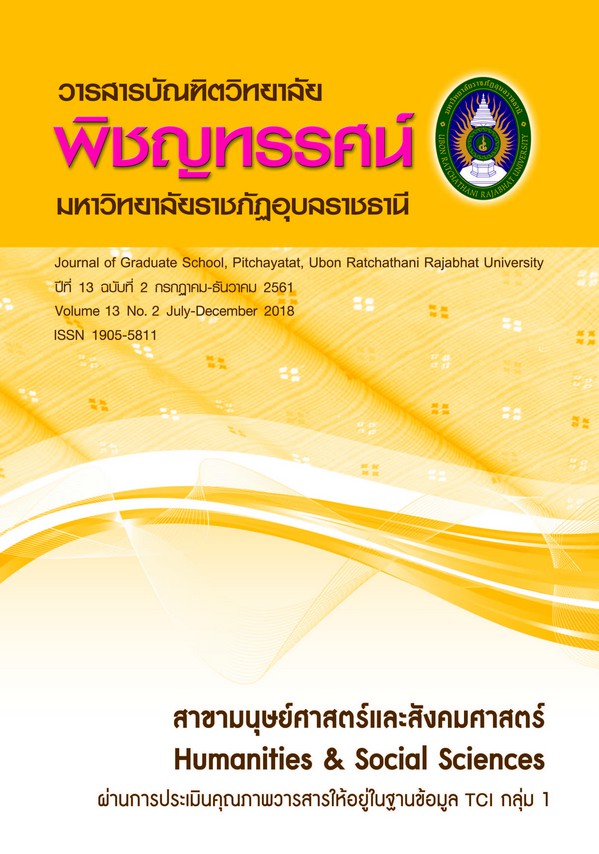การพัฒนาบทเรียนบนเว็บตามแนวทฤษฎีคอนสตรัคติวิสต์ที่ส่งเสริมทักษะการคิดวิเคราะห์ เรื่อง คอมพิวเตอร์ในชีวิตประจำวัน ของนักเรียนชั้นมัธยมศึกษาปีที่ 1
คำสำคัญ:
บทเรียนบนเว็บตามแนวทฤษฎีคอนสตรัคติวิสต์, ทฤษฎีคอนสตรัคติวิสต์, ทักษะการคิดวิเคราะห์บทคัดย่อ
การวิจัยในครั้งนี้มีความมุ่งหมายเพื่อ 1. พัฒนาบทเรียนบนเว็บตามแนวทฤษฎีคอนสตรัคติวิสต์ที่ส่งเสริมทักษะการคิดวิเคราะห์ เรื่อง คอมพิวเตอร์ในชีวิตประจำวัน ของนักเรียนชั้นมัธยมศึกษาปีที่ 1 ที่มีประสิทธิภาพตามเกณฑ์ 80/80 2. ศึกษาค่าดัชนีดัชนีประสิทธิผลของการพัฒนาบทเรียนบทเว็บตามแนวทฤษฎีคอนสตรัคติวิสต์ ที่ผู้วิจัยพัฒนาขึ้น 3. เปรียบเทียบผลสัมฤทธิ์ทางการเรียนและทักษะการคิดวิเคราะห์หลังเรียนด้วยบทเรียนบนเว็บตามแนวทฤษฎีคอนสตรัคติวิสต์ และการเรียนแบบปกติ 4. ศึกษาความพึงพอใจของนักเรียนที่เรียนด้วยบทเรียนบนเว็บตามแนวทฤษฎีคอนสตรัคติวิสต์ กลุ่มตัวอย่างที่ใช้ในการวิจัย ได้แก่ นักเรียนชั้นมัธยมศึกษาปีที่ 1 ภาคเรียนที่ 1 ปีการศึกษา 2560 จำนวน 80 คน โรงเรียนเทศบาลวัดสระทอง จังหวัดร้อยเอ็ด จำนวน 2 ห้องเรียน ได้มาโดยการสุ่มกลุ่มตัวอย่างแบบกลุ่ม (Cluster Random Sampling) แบ่งเป็นกลุ่มทดลอง ได้แก่ กลุ่มที่เรียนด้วยบทเรียนบทเว็บตามแนวทฤษฎีคอนสตรัคติวิสต์ คือ นักเรียนชั้นมัธยมศึกษาปีที่ 1/1 และกลุ่มควบคุม ได้แก่ กลุ่มที่เรียนแบบปกติ คือ นักเรียนชั้นมัธยมศึกษาปีที่ 1/2 เครื่องมือที่ใช้ในการวิจัยครั้งนี้ ได้แก่ 1) บทเรียนบนเว็บตามแนวทฤษฎีคอนสตรัคติวิสต์ เรื่อง คอมพิวเตอร์ในชีวิตประจำวัน 2) แผนการจัดการเรียนรู้ กลุ่มสาระการเรียนรู้การงานอาชีพและเทคโนโลยี ชั้นมัธยมศึกษาปีที่ 1 จำนวน 4 แผน 3) แบบทดสอบวัดผลสัมฤทธิ์ทางการเรียนของนักเรียนที่เรียนด้วยบทเรียนบนเว็บตามแนวทฤษฎีคอนสตรัคติวิสต์ เรื่อง คอมพิวเตอร์ในชีวิตประจำวัน แบบปรนัย จำนวน 30 ข้อ มีค่าระดับความยากตั้งแต่ 0.40-0.78 ค่าอำนาจจำแนกรายข้อตั้งแต่ 0.32-0.75 และค่าความเชื่อมั่นเท่ากับ 0.87 4) แบบทดสอบวัดทักษะการคิดวิเคราะห์ตามทฤษฎีของ Bloom แบบปรนัย จำนวน 30 ข้อ มีค่าระดับความยากตั้งแต่ 0.34−0.75 ค่าอำนาจจำแนกรายข้อตั้งแต่ 0.28-0.82 และค่าความเชื่อมั่นเท่ากับ 0.90 5) แบบวัดความพึงพอใจของนักเรียนที่มีต่อบทเรียนบนเว็บตามแนวทฤษฎีคอนสตรัคติวิสต์ จำนวน 10 ข้อ มีค่าความเชื่อมั่นเท่ากับ 0.79 สถิติที่ใช้ในการวิเคราะห์ข้อมูล ได้แก่ ค่าเฉลี่ย ร้อยละ ส่วนเบี่ยงเบนมาตรฐาน ทดสอบสมมติฐานด้วยการทดสอบค่าทีของตัวแปรที่เป็นอิสระต่อกัน ผลการวิจัยปรากฏดังนี้ 1. บทเรียนบนเว็บตามแนวทฤษฎีคอนสตรัคติวิสต์ที่ส่งเสริมทักษะการคิดวิเคราะห์ เรื่อง คอมพิวเตอร์ในชีวิตประจำวัน ของนักเรียนชั้นมัธยมศึกษาปีที่ 1 มีประสิทธิภาพเท่ากับ 81.15/88.16 2. ค่าดัชนีประสิทธิผลมีค่าเท่ากับ 0.7774 ซึ่งเท่ากับบทเรียนบทเว็บตามแนวทฤษฎีคอนสตรัคติวิสต์ที่ผู้วิจัยพัฒนาขึ้น ทำให้นักเรียนมีความก้าวหน้าในการเรียน คิดเป็นร้อยละ 77.74 3. นักเรียนที่เรียนด้วยบทเรียนบนเว็บตามแนวทฤษฎีคอนสตรัคติวิสต์ ที่ผู้วิจัยสร้างขึ้น มีคะแนนวัดผลสัมฤทธิ์ทางการเรียนและคะแนนทักษะการคิดวิเคราะห์ หลังเรียนสูงกว่าการเรียนแบบปกติอย่างมีนัยสำคัญทางสถิติที่ระดับ .01 4. สำหรับนักเรียนระดับชั้นมัธยมศึกษาปีที่ 1 มีความพึงพอใจในระดับมาก (x̄= 4.11, S.D. = 0.77)
เอกสารอ้างอิง
คณาจารย์ภาควิชาวิจัยและพัฒนาการศึกษา. วิธีการทางสถิติสำหรับการวิจัย. พิมพ์ครั้งที่ 5.กาฬสินธุ์: ประสานการพิมพ์, 2553.
ชัยยงค์ พรหมวงศ์. การทดสอบประสิทธิภาพสื่อหรือชุดการสอน. ศิลปากรศึกษาศาสตร์.5,1 (2556):7-19
ไชยยศ เรืองสุวรรณ. การออกแบบพัฒนาโปรแกรมบทเรียนและบทเรียนบนเว็บ. พิมพ์ครั้งที่ 14. มหาสารคาม : คณะศึกษาศาสตร์ มหาวิทยาลัยมหาสารคาม, 2553.
ณัฐกฤตา อุทัยแสน. ผลการใช้บทเรียนตามแนวคอนสตรัติวิสต์และการเรียนตามคู่มือครู สาระเทคโนโลยีและการสื่อสาร ที่มีต่อผลสัมฤทธิ์ทางการเรียนความสามารถในการคิดวิเคราะห์และทักษะทางด้านคอมพิวเตอร์ ของนักเรียน ชั้นมัธยมศึกษาปีที่ 1.วิทยานิพนธ์การศึกษามหาบัณฑิตมหาวิทยาลัยมหาสารคาม, 2556.
ทดสอบทางการศึกษาแห่งชาติ, สถาบัน. ระบบประกาศและรายงานผลสอบโอเน็ต. (ออนไลน์) 2558 (อ้างเมื่อ 14 มีนาคม 2558). จาก http://www.niets.or.th
ปาริชาติ พองพรหม. การพัฒนาบทเรียนบทเว็บ เรื่อง อาณาจักรสุโขทัย ชั้นมัธยมศึกษาปีที่ 1. วิทยานิพนธ์การศึกษามหาบัณฑิต มหาวิทยาลัยราชภัฏสกลนคร, 2554.
พรพรรณ จันทร์วงศ์. ผลการใช้บทเรียนคอมพิวเตอร์ช่วยสอนตามแนวคอนสตรัคติวิสต์ เรื่องจำนวนเต็ม ที่มีต่อความสามารถในการคิด วิเคราะห์ ของนักเรียนชั้นมัธยมศึกษาปีที่ 1.วิทยานิพนธ์ศึกษาศาสตรมหาบัณฑิต มหาวิทยาลัยมหาสารคาม, 2558.
รัตนาภรณ์ สาบุตร. ผลการเรียนด้วยบทเรียนบนเว็บแบบ NTeQ และการเรียนตามคู่มือครู เรื่องความรู้เบื้องต้นเกี่ยวกับอินเทอร์เน็ตต่อผลสัมฤทธิ์ทางการเรียนและการคงทนความรู้ของนักเรียน ชั้นมัธยมศึกษาปีที่ 2 ที่มีความสามารถด้านคอมพิวเตอร์ต่างกัน. วารสารวิชาการมหาวิทยาลัยราชภัฏบุรีรัมย์ .2, 2 (กรกฎาคม – ธันวาคม 2553): 30- 43.
วิภาวรรณ ใหญ่สมบูรณ์. ผลของการสอนบนเว็บที่มีต่อการพัฒนาการคิดวิเคราะห์ สำหรับนักเรียนชั้นมัธยมศึกษาปีที่ 2. วารสารศึกษาศาสตร์ ฉบับวิจัยบัณฑิตศึกษา. 5, 2 (เมษายน - มิถุนายน 2554): 107 -111.
ศึกษาธิการ, กระทรวง. หลักสูตรแกนกลางการศึกษาขั้นพื้นฐาน พุทธศักราช 2551. กรุงเทพฯ : โรงพิมพ์ชุมชนสหกรณ์การเกษตรแห่งประเทศไทย จำกัด, 2551.
สุพจน์ ดอกจันกลาง. ผลการเรียนด้วยบทเรียนบนเว็บผสมผสานแบบใช้ปัญหาเป็นฐานกับการเรียนแบบใช้ปัญหาเป็นฐาน เรื่อง เทคโนโลยีสารสนเทศและการสื่อสาร ชั้นมัธยมศึกษาปีที่ 2.วารสารมหาวิทยาลัยราชภัฏมหาสารคาม. 8, 2 (พฤษภาคม–สิงหาคม 2557): 149–158.
สุมาลี ชัยเจริญ. การพัฒนาโมเดลแบบสิ่งแวดล้อมทางการเรียนรู้บทเครือข่ายที่ส่งเสริมการสร้างความรู้ตามแนวคอนสตรัติวิสต์.(รายการวิจัย).ขอนแก่น : มหาวิทยาลัยขอนแก่น, 2550.
ดาวน์โหลด
เผยแพร่แล้ว
รูปแบบการอ้างอิง
ฉบับ
ประเภทบทความ
สัญญาอนุญาต
บทความทุกเรื่องได้รับการตรวจความถูกต้องทางวิชาการโดยผู้ทรงคุณวุฒิภายนอกอย่างน้อย 3 คน ความคิดเห็นในวารสารพิชญทรรศน์เป็นความคิดเห็นของผู้นิพนธ์มิใช่ความคิดเห็นของผู้จัดทำ จึงมิใช่ความรับผิดชอบของวารสารพิชญทรรศน์ และบทความในวารสารพิชญทรรศน์สงวนสิทธิ์ตามกฎหมายไทย การจะนำไปเผยแพร่ต้องได้รับอนุญาตเป็นลายลักษณ์อักษรจากกองบรรณาธิการ





